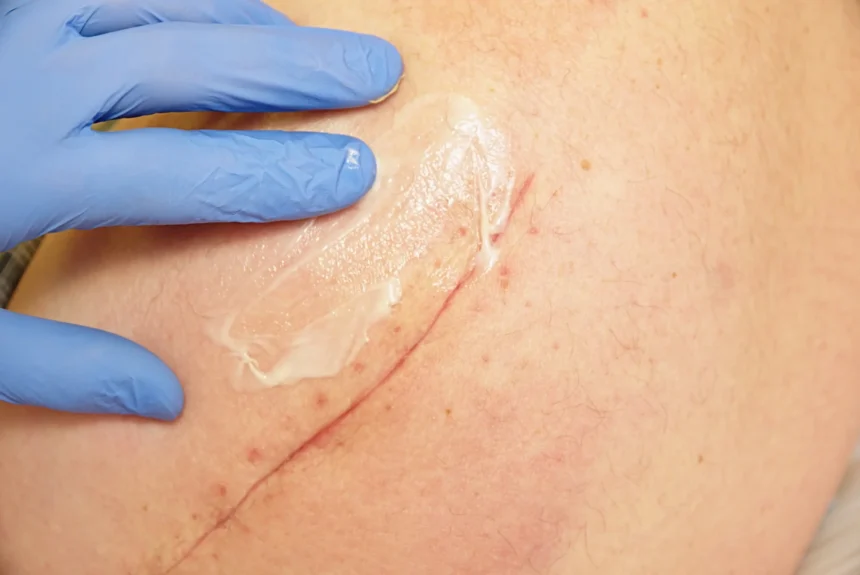Scars are part of how your body naturally heals from a scraped knee to post-surgical recovery. While some marks fade quietly, others linger as visible reminders of past injuries. Whether it’s a surgical incision, a cut from an accident, or post-acne marks, the question many ask is: When is the right time to use an anti-scar ointment?
The timing of your scar care routine plays a critical role in how well the skin recovers. Starting too early may disrupt healing. Starting too late may slow down visible improvement. This blog will help you understand exactly when and how to begin applying an anti scar ointment to give your skin the best chance at a smooth, healthy recovery.
How do Scars Form?
Understanding the science behind scar formation helps set realistic expectations. When the skin is injured, it goes through three distinct stages:
- Inflammation (Days 1–3): The immune system responds to stop bleeding and protect against infection.
- Tissue Formation (Days 4–21): New collagen begins to form, and the wound starts to close.
- Remodelling (3 weeks to a year): Collagen realigns, and the scar begins to mature and flatten.
The remodelling phase is when a scar’s final appearance is determined. This is also the ideal window to start scar management. Early intervention once the skin is healed can support better texture, reduced discolouration, and softer skin over time.
When to Start Using an Anti-Scar Ointment?
The right time to begin using an anti-scar ointment is crucial to your skin’s recovery journey. Applying it too early or too late can limit its effectiveness. Here’s when to begin for the best results.
- After Wounds Heal Completely
Never apply an anti-scar ointment on broken, oozing, or scabbed skin. Wait until the skin has fully closed, is no longer inflamed, and shows no signs of infection. Applying too early can interfere with natural healing or increase the risk of irritation.
- For Surgical Scars
For post-surgical care, most dermatologists and surgeons recommend waiting 10 to 14 days post-procedure after the sutures are removed and the skin is sealed. However, this can vary based on your procedure; always confirm with your doctor before beginning topical scar treatment.
- For Cuts or burns
Whether it’s a kitchen burn or a minor skin injury, the same principle applies: wait until there’s no open skin. The ointment should only be applied once the skin surface is intact, dry, and free of scabs or peeling.
- For Older Scars
Even if a scar is several months or even years old, an anti-scar ointment may still help improve its appearance. Results might be slower and more subtle, but consistent use can soften texture, reduce redness, and enhance skin tone. This is particularly true for raised scars or post-acne pigmentation.
Application Tips for Best Results
Consistency and technique matter just as much as the product you choose. Here’s how to get the most from your anti-scar ointment:
- Clean and dry the area before application.
- Use a small amount; a thin layer is enough.
- Massage gently in a circular motion to improve absorption.
- Apply twice daily (or as directed on the packaging).
- Stay consistent for at least 8–12 weeks. Deeper scars may require longer.
Avoid harsh exfoliants or alcohol-based products near the scarred area during the treatment phase, as these can irritate newly formed skin.
What to Look for in a Good Anti-Scar Ointment?
The effectiveness of an anti-scar ointment depends on the formulation. Choose products that prioritise skin recovery without harsh ingredients. Here’s what to look for:
- Proven Active Ingredients
Allantoin: Boosts cell regeneration and softens tissue.
Panthenol (Vitamin B5): Hydrates and improves elasticity.
Botanical Extracts like Onion or Centella Asiatica: Reduce inflammation and support healing.
- Safe Formulation
Non-irritating and non-comedogenic (especially important for facial use).
Fragrance-free and gentle enough for sensitive or post-procedure skin.
- Clinically Tested
Look for dermatologist-recommended products backed by clinical studies.
If your concern is acne marks or post-inflammatory hyperpigmentation, you may also consider an anti pimple scar cream. These are often enriched with niacinamide or azelaic acid to fade dark spots and improve texture while still being gentle enough for acne-prone skin.
Take Control of Scar Healing: Start at the Right Time
Scars are natural, and they don’t need to be hidden or erased to validate your skin’s worth. Choosing the right time to begin treatment with an anti-scar ointment can influence how your skin recovers. Whether it’s a new surgical line, a fading acne mark, or a burn from months ago, the key lies in timing, consistency, and gentle care.
Many clinically tested scar ointments available today, like Mederma, are formulated to be safe, effective, and backed by dermatological science. With informed choices and the right support, you can give your skin a chance to heal well without harsh interventions.
Scars tell your story, but with the right care, you can help them fade with confidence.






